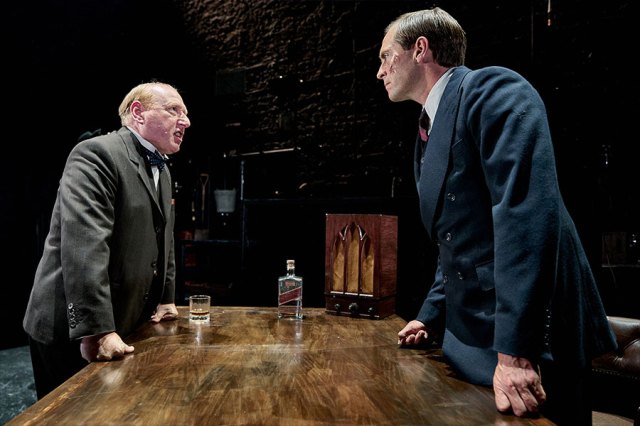
As he approaches his final straight at the Donmar, artistic director Michael Longhurst seems to be programming a guide to the history of the early 20th century. Hot on the heels of a rare revival of Lilian Hellman’s Watch on the Rhine, a call-to-arms against Nazism, and Tinuke Craig’s Trouble in Butetown about love and racism in wartime Cardiff, comes a play about Winston Churchill and the BBC.
Playwright Jack Thorne doesn’t examine Churchill as rousing wartime leader, but instead concentrates on the 12 days of the General Strike in 1926 when he was, as Chancellor of the Exchequer, chief propagandist on behalf of Stanley Baldwin’s government, leading the charge against the TUC who called their members out to support the miners’ claims for better pay and conditions. The authorities fear Bolshevik revolution; the workers just want a fair deal.
It’s a fascinating segment of history, when – as Thorne said in an interview – “everything could have happened in a different way” and his play creates a shimmering sense of the past as John Reith struggled to preserve the independence of his nascent British Broadcasting Company, then just four years old, by preventing it from being commandeered as a direct arm of government.
The BBC then was a very different organisation from the one it has become, and Thorne has a lot of fun with recreating the variety acts, comics and crooners who filled the airwaves, in between high-minded debates and an episode of Woman’s Hour that asks ‘are women more barbaric than men?’ But the point of the play is to show that this was a defining moment for the organisation, when, with all the papers closed by the strike, news became its bread and butter – and the way it reported events began to change for ever.
Katy Rudd’s fleet and fluid production is wonderful at conjuring the sense of discovery the new medium offered. It opens with a flash of magic: actors with the help of Ben and Max Ringham’s superb sound design turn into Foley technicians to create the sounds of work, with pickaxe, shovel, a rusty lawnmower and poured sand. Throughout the action they add sound effects: swirling water in a goldfish bowl becomes a running river, a stabbed orange a gouged eye, snapped celery a gunshot, a gunshot (wittily) a champagne cork.
This sense of excitement and novelty is also emphasised by the old-fashioned mics, propelled in front of speakers on Laura Hopkins’ elegantly stripped-back set, accompanied by warnings that if they sneeze they will “deafen millions.” No wonder Reith is so thrilled by the possibility of a nation gathering around the wireless and becoming as one in their equality of listening; no wonder the government wants to seize control.
But the strength of Thorne’s play is its balance. His Reith, mesmerically played by Stephen Campbell-Moore, is no hero of the people; he’s a tortured man, consumed by his desire to do good, yet he concedes ground to Hayden Gwynne’s bullish Baldwin at every turn, refusing to let Labour leaders broadcast, and ultimately turning down the opportunity to air the Archbishop of Canterbury’s plea for compromise.
The weakest strand of the piece is its suggestion that Reith’s conflicted sexuality and his love affair with a young man called Charlie (Luke Newberry) led to his uncertainty. But when Reith is in direct conflict with Adrian Scarborough’s suave, humorous yet furious and blustering Churchill, the play blazes into life, the strength of their arguments swinging from side to side.
Around these two fine actors, staking the ground, a superb supporting cast bring multiple roles to blazing life. Kitty Archer brings a note of wonder and realism to her role as Reith’s factotum, Gwynne is glorious in each part she plays. All in all, as in The Motive and the Cue currently playing at the National Theatre, Thorne triumphantly uses real history to create a compelling drama that is both amusing, touching and revealing.

















